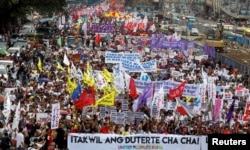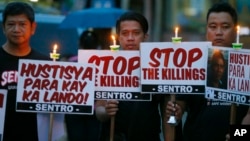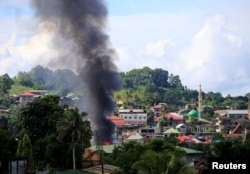Philippine President Rodrigo Duterte’s now-rescinded offer to resign less than halfway into his term follows increased anger about the persistence of corruption, rebel violence and skepticism of an alliance with China, say experts who follow the country closely.
The leader said this month he would quit, but later reversed his opinion, according to Philippine news media and a statement on the Senate website.
While Duterte is not expected to leave — Filipinos say he often talks tougher than he acts — analysts say his comment reflects trouble overcoming long-term problems in the Southeast Asian country despite an agenda to solve them.
He particularly wants to stop corruption and drug dealing, disarm rebel insurgencies and work with China on infrastructure development, they say.
“I think Duterte’s rather volatile temperament, coupled with what appears to be his growing frustration with the lack of progress on several of his key initiatives like his anti-drug campaign, peace initiatives with both Muslim and communist separatists … is the primary reason for his outbursts about resigning before his presidential term ends in 2022,” Carl Baker, director of programs with the think tank Pacific Forum CSIS in Honolulu, said.
Duterte thought he could complete more of his agenda, with less work, sooner in his term, some analysts say.
No plans to quit
Duterte, who took office in June 2016, has talked before of resigning well before the end of his six-year term.
He vowed two years ago that he would resign if he could not rid the country of drugs and criminality after three to six months, Philippine Sen. Leila de Lima noted in an Aug. 22 news release.
Duterte, the 73-year-old former mayor of the second-largest Philippine city, Davao, also raised the topic in July but said his own people, not the separately elected vice president, should replace him.
“He’s just his usual self, he’s thinking out loud,” said Antonio Contreras, political scientist at De La Salle University in the Philippines. “My honest assessment is that he’s not serious about it.”
Crime and corruption
Although many Filipinos say they feel safer in the streets under Duterte than before, the president says the illegal drug problem might worsen before his term ends in 2022.
He has made a name worldwide, drawing rebukes from Western governments and foreign nongovernmental organizations, by using what they call extrajudicial killings to stop illegal drug sales. The Catholic Bishops’ Conference of the Philippines estimates 13,000 killings linked to the campaign.
“(The threat to resign is) not really something new, except in this case it has underscored frustration over his failure to end the drug problem, even saying that the illegal drug problem would probably get worse before end of his term, and that’s despite thousands that they have killed,” said Renato Reyes, secretary general of the Bagong Alyansang Makabaya alliance of social causes in Manila.
Corruption remains an issue partly because people in Duterte’s administration perpetuate it, Reyes said.
Duterte vowed in his July state of the nation address to keep fighting graft. He has fired at least 24 people, but news website Rappler.com says four of them were reappointed and 20 have yet to face charges.
Rebel insurgencies
Duterte also frets over an impasse with the occasionally violent, 50-year-old New People’s Army communist insurgency, said Herman Kraft, a political science professor at the University of the Philippines Diliman in Metro Manila. The insurgency clashed with troops outside Manila in late July as the government pressed them for talks.
“He doesn’t see why the communists are still pursuing their agenda through an armed insurgency,” Kraft said. “The main point, I think from his perspective, is that if you want to do politics, do it the proper way, run for office, work with the government.”
Last month the president got his way when congress passed a bill that raises the level of Muslim autonomy in the south, where about 120,000 have died because of a decadeslong insurgency. Muslims there believe the country’s Christian majority controls too many resources.
But not every Muslim group backs the bill, said Rhona Canoy, president of an international school on the southern island Mindanao. Satisfaction depends on “which political faction you’re with,” she said. The bill offers autonomy to a region of Mindanao but does not specify which groups will run it.
On other issues, Duterte still struggles for widespread acceptance of a budding friendship with China despite an unresolved maritime sovereignty dispute. People in the armed forces particularly distrust Beijing.
“I think he’s just getting really tired of everything that he’s doing being opposed every step of the way,” Canoy said.







